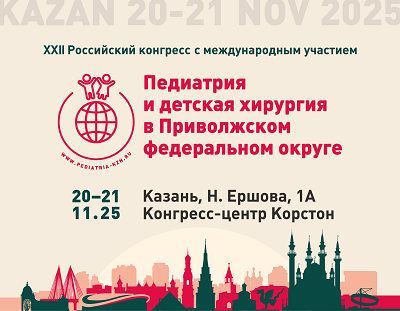Correction of the acid-base balance in the presence of the hypoxic-ischemic brain damage in newborns
https://doi.org/10.21508/1027-4065-2018-63-1-40-45
Abstract
One of the current problems of perinatal neurology is the hypoxic-ischemic brain damage in newborns associated with the influence of the hypoxia upon the fetus, intranatal and postnatal asphyxia on one hand and a lack of the efficient therapy schemes on the other hand. Due to this, the purpose of this pilotstudy isto identify the effects of drug Cytoflavin, included into the complex therapy scheme for the newborns with the cerebral ischemia of II-III stages, on the blood acid-base balance. A retrospective analysis of the results of the complex therapy for 16 newborns with the moderate (14 children) and severe (2 children) brain ischemia was performed. Cytoflavin was included in the standard therapy schemes for all children at a dose of 2 ml/kg per day at a dilution of 5% glucose solution at the ratio of 1:5, intravenously, microfluidically for 20 hours for 3 days. In addition to the standard examination, the blood acid-base balance assessment using the follow-up microgasometric method was included (after 60 min and then every 6 hours until 72 hours of observation). All children had positive tendency to the arresting of the metabolic acidosis (in the form of the decrease of the base deficiency after 24 hours and increase of pH level (the level of 7.30 was reached by 12 hours of age in full-term newborns and 24 hour of age in the preterm newborns). The revealed positive changes in the time of the metabolic acidosis arresting along with the small volumes of the infusion and good tolerability are the cause for the planning of the subsequent, more large-scale studies.
About the Authors
K. S. KiriakovRussian Federation
R. B. Khatagova
Russian Federation
E. V. Trizna
Russian Federation
Z. A. Zelenina
Russian Federation
A. V. Yakovlev
Russian Federation
N. A. Petrova
Russian Federation
References
1. Shankaran S. Neonatal encephalopathy: treatment with hypothermia. J Neurotrauma 2009; 26(3): 437–443. DOI: 10.1089/neu.2008.0678.
2. Busl K.M., Greer D.M. Hypoxic-ischemic brain injury: patho-physiology, neuropathology and mechanisms. Neurorehabilitation 2010; 26(1): 5–13. DOI: 10.3233/NRE-2010-0531
3. Ivanov D.O. Violations of the acid-base state. Guideline of Perinatology. D.O. Ivanov (ed.). SPb: Inform-Navigator 2015; 1216. (in Russ)
4. Skoromec A.P., Shhugareva L.M., Shumilina S.V., Gorelik Yu.V. The improvement of treatment efficacy in newborn full-term infants with severe birth asphyxia. Zh Nevrol Psikhiatr Im S S Korsakova 2016; 116(4): 83–88. DOI: 10.17116/jnevro20161163283-88. (in Russ.)
5. Afanas’ev V.V. Cytoflavin in intensive care. Manual for doctors. SPb, 2005, 36. (in Russ.)
6. Burkova A.S., Volodin N.N., Zhurba L.T., Medvedev M.I., Rogatkin S.O., Timonina O.V. Classification of perinatal lesions of the nervous system and their consequences in children of the first year of life. Methodical recommendations of the Russian Association of Perinatal Medicine Specialists. Vopr praktich pediatr 2006; 1(5): 38–70. (in Russ.)
7. Bul’on V.V., Khnychenko L.K., Sapronov N.S., Kovalenko A.L., Alekseeva L.E. Correction of postischemic reperfusion injury complications by cytoflavin. Biull Eksp Biol Med 2000; 129(2): 149–151. (in Russ.)
8. Rogatkin S.O., Volodin N.N., Degtiareva M.G., Grebennikova O.V., Marganiia M.Sh., Serova N.D. Current approaches to cerebroprotective treatment of premature newborns in reanimation and intensive care departments. Zh Nevrol Psikhiatr Im S.S. Korsakova 2011; 111(1): 27–32. (in Russ.)
9. Rogatkin SO, Volodin NN. Modern approaches to the complex therapy of perinatal CNS lesions in newborns. Farmateka 2004; 1: 72–83. (in Russ)
10. Aleksandrovich Yu.С., Pshenisnov K.V. Infusion Antihypoxants in Children with Critical Conditions. Obshchaya Reanimatologiya/General Reanimatology 2014; 10(3): 59–74. DOI:10.15360/1813-9779-2014-3-59-74. (in Russ)
11. Law J. Cerebral perfusion, metabolism and outcome. Curr Opin Pediatr 1995; 7: 132–139.
12. Rogatkin S.O., Degtiareva M.G., Grebennikova O.V., Volodin N.N., Sigova Yu.A., Asmolova G.A., Serova N.D. Clinical-encephalographic evaluation of preterm children treated with cytoflavin during the first year of life. Zh Nevrol Psikhiatr Im S.S. Korsakova 2011; 111(5): 16–23. (in Russ)
13. Degtjareva E.A, Romancov M.G., Zhdanova O.I., Miheev A.A., Avakjan A.A. Cytoflavin as a means of correcting posthypoxic myocardial damage in newborns. Profilaktich i klinich meditsina 2010; 2(35): 37–40. (in Russ)
14. Cytoflavin: experience in neonatology. Information for neonatologists. S.O. Rogatkin, E.A. Degtjarev, M.G. Romancov (eds). SPb 2013; 28. (in Russ)
15. Zav’jalov A.E., Meshkov M.V., Ilinskaja L.M., Kurdeko I.V., Miller Ju.V. Principles of infusion therapy in children. Textbook. Barnaul 2010; 35. (in Russ)
Review
For citations:
Kiriakov K.S., Khatagova R.B., Trizna E.V., Zelenina Z.A., Yakovlev A.V., Petrova N.A. Correction of the acid-base balance in the presence of the hypoxic-ischemic brain damage in newborns. Rossiyskiy Vestnik Perinatologii i Pediatrii (Russian Bulletin of Perinatology and Pediatrics). 2018;63(1):40-45. (In Russ.) https://doi.org/10.21508/1027-4065-2018-63-1-40-45











































